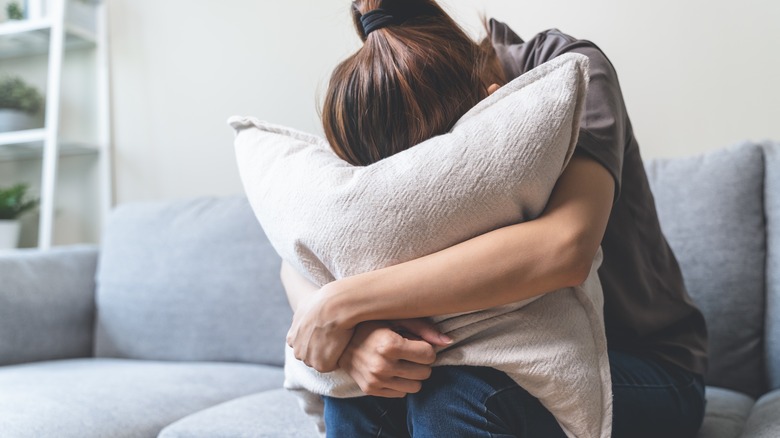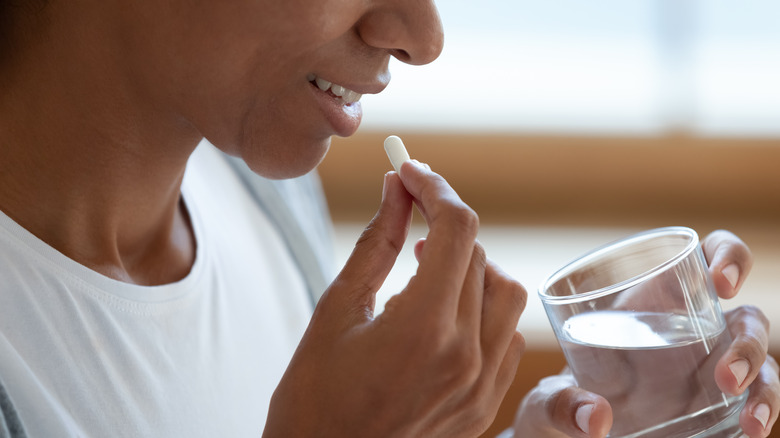How B-Complex Vitamins Might Help Treat Anxiety
Navigating feelings of overwhelm is never easy — but for the 40 million Americans living with an anxiety disorder, it can make the ebbs and flows of everyday life feel almost insurmountable. Luckily, anxiety disorders are highly treatable, particularly when medications — like selective serotonin reuptake inhibitors (SSRIs), benzodiazepines, or certain antidepressants — are used in conjunction with therapy (per Anxiety and Depression Association of America). However, because these medications tend to come with a laundry list of side effects, many people opt for more natural ways to treat their anxiety symptoms, recruiting the help of herbs and supplements that can work to improve mood.
A quick Google search will prove that B-complex vitamins are often at the top of the list when it comes to supplements that can help to alleviate the symptoms that come with anxiety disorders. But how do they work, exactly? And how can we use them to get the most relief? Let's find out.
B-complex vitamins and anxiety
When we talk about B vitamins, it's important to acknowledge that we're not just referring to one vitamin, but rather 8 different vitamins that all fall under the B vitamin blanket (per Medical News Today). These include thiamin (B1), riboflavin (B2), niacin (B3), pantothenic acid (B5), pyridoxine (B6), biotin (B7), folic acid (B9), and cobalamin (B12). When you take a B-complex vitamin, you're taking all of these B vitamins — each of which serves a different purpose in the body. Some of these B vitamins can even help in the treatment of anxiety.
A 2008 study published in Integrative Medicine Insights suggests that B1 is an effective treatment for anxiety disorders, and can help with symptoms ranging from insomnia and chronic fatigue to digestive issues and aggression. It works by supporting the central nervous system, allowing the body to better cope with stress. Another 2005 study published in the Journal of Orthomolecular Medicine found that when patients with anxiety are given high doses of B3, the effect on the brain is similar to that of benzodiazepines. It can even help to boost serotonin levels! What's more, people who are deficient in vitamins B9 and B12 are at a higher risk for anxiety and depression. Supplementation of these vitamins — particularly when used together — can aid in the metabolization of serotonin, showing a marked reduction in anxiety symptoms (per Talkspace).
Vitamin B6 and anxiety
Many of the B vitamins can help in the treatment of anxiety disorders, especially vitamin B6. In a 2022 study published in Human Psychopharmacology, researchers discovered that — when given in high doses — vitamin B6 was effective in reducing symptoms of anxiety in participants with self-reported anxiety disorders and led to a trend toward lessened depression symptoms as well.
Medical News Today explains that for the brain to function properly, a precise balance between excitatory neurons and inhibitory neurons must be maintained. When the balance is disrupted, anxiety and depression disorders tend to follow. The study revealed that vitamin B6 has the ability to assist the body in the production of a certain chemical that inhibits neural excitation — the result of which lends to a calming effect. However, it's worth noting that in order to achieve these results, participants in the study were given 100 milligrams of B6 — an amount that far exceeds the daily recommended dietary allowance of 1.7mg.



